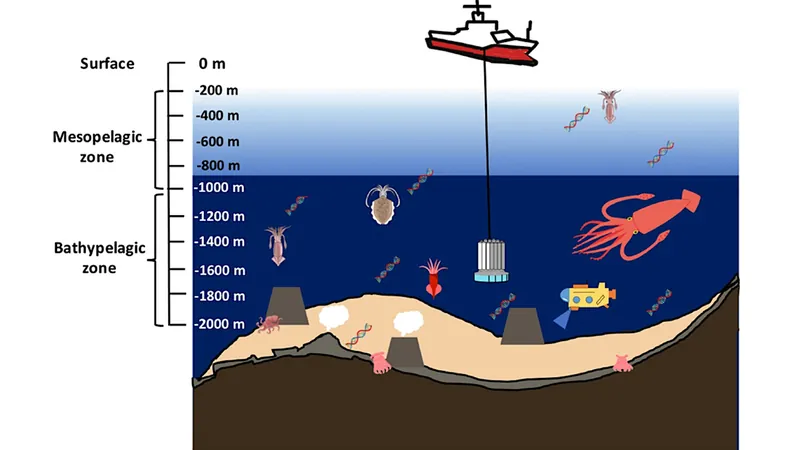
Unlocking the Secrets of the Deep: Fresh Techniques to Detect Cephalopod DNA
2025-04-16
Author: Charlotte
Revolutionary DNA Probes Unveil the Hidden Lives of Cephalopods
In a groundbreaking development, scientists from Kobe University have introduced innovative DNA probes that make it easier to explore the enigmatic lives of squids and octopuses lurking in the deep sea. This advanced technology is set to enhance marine ecological research and bolster conservation efforts.
The Vital Role of Cephalopods in Marine Ecosystems
Squids and octopuses are not just intriguing creatures; they play a pivotal role in the marine ecosystem, contributing to nutrient distribution and energy flow in the food web. According to marine ecologist Wu Qianqian, understanding the distribution of these species—collectively known as cephalopods—is essential, especially given that their deep-sea habitats are largely uncharted and difficult to access.
The Challenge of Detecting Deep-Sea Species
The vast expanses of the deep ocean conceal numerous organisms, many of which remain a mystery to science. Wu emphasizes the importance of effective methods to survey these elusive creatures. To tackle this, her team developed an innovative detection system that captures environmental DNA (eDNA) released into the water.
How Environmental DNA Metabarcoding Works
Utilizing a technique known as environmental DNA metabarcoding, the researchers designed small DNA probes akin to bait used by fishermen. This method targets specific genetic material, allowing scientists to identify various cephalopod species without the need for direct observation.
A Collaborative Effort Leads to Success
Collaboration has been key in this project. Wu's lab partnered with researchers from the Japan Agency for Marine-Earth Science and Technology (JAMSTEC) to devise a system capable of collecting extensive deep-sea samples. Their research, published in the journal Marine Environmental Research, reveals new DNA probes—referred to as "primers"—that can effectively detect DNA from a wide range of cephalopod species.
Detecting Cephalopods Like Never Before
Remarkably, their technique successfully identified cephalopod DNA from sea depths of up to 2,000 meters, marking a significant achievement in deep-sea exploration. A crucial advantage lay in targeting longer DNA fragments, which, while potentially more fragile, proved to be more informative in colder deep-sea environments.
Insights into Octopus Habitats
The research revealed that octopus DNA was exclusively found in deeper waters. This observation supports the hypothesis that the detection technique is capable of unraveling the ecological habits of these creatures, as octopuses are known to be solitary and bottom-dwelling.
Looking Ahead: Future Research and Collaboration
Wu acknowledges the need for ongoing improvements in sampling strategies to better capture the life histories and behaviors of different cephalopods. She emphasizes the importance of addressing potential misidentifications caused by errors in DNA databases, highlighting an intention to fortify collaboration between molecular biologists and taxonomists. Wu remains optimistic, stating, "Our technique is set to unlock new avenues for deep-sea cephalopod research and to lay the groundwork for marine conservation."
Behind the Research: Kobe University's Legacy
Kobe University, founded in 1902, has evolved into a premier research institution in Japan. With nearly 16,000 students and a faculty of approximately 1,700, the university aims to blend social and natural sciences to cultivate leaders ready to tackle societal challenges.









 Brasil (PT)
Brasil (PT)
 Canada (EN)
Canada (EN)
 Chile (ES)
Chile (ES)
 Česko (CS)
Česko (CS)
 대한민국 (KO)
대한민국 (KO)
 España (ES)
España (ES)
 France (FR)
France (FR)
 Hong Kong (EN)
Hong Kong (EN)
 Italia (IT)
Italia (IT)
 日本 (JA)
日本 (JA)
 Magyarország (HU)
Magyarország (HU)
 Norge (NO)
Norge (NO)
 Polska (PL)
Polska (PL)
 Schweiz (DE)
Schweiz (DE)
 Singapore (EN)
Singapore (EN)
 Sverige (SV)
Sverige (SV)
 Suomi (FI)
Suomi (FI)
 Türkiye (TR)
Türkiye (TR)
 الإمارات العربية المتحدة (AR)
الإمارات العربية المتحدة (AR)